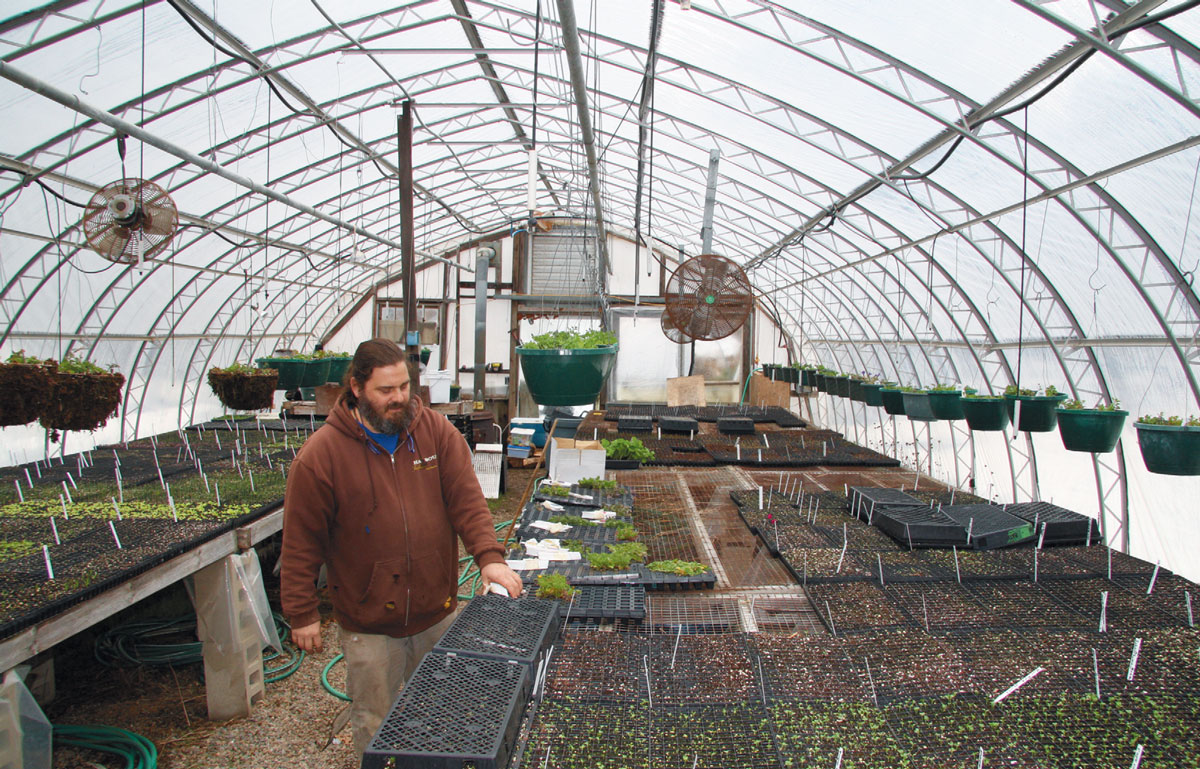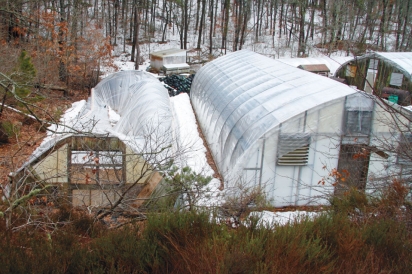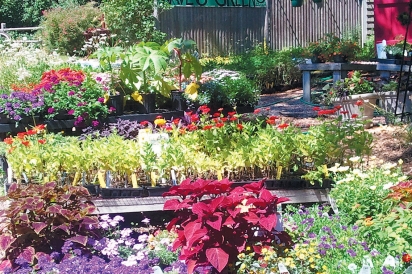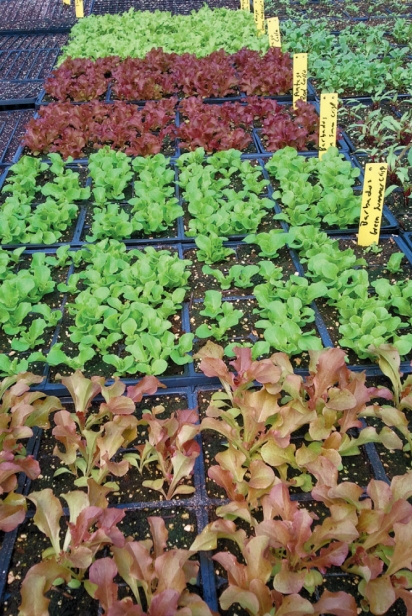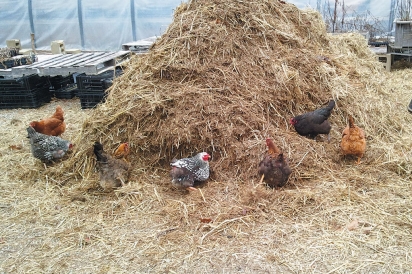Dave DeWitt, the Greens Keeper of Truro: Weathering the Storms
A sturdy root structure, much like the foundation of a building, is vital for a vibrant, healthy plant. The same can be said for a man. Time, in the form of wind, water and temperature, is a constant force wearing down all things living and inanimate. Without a solid base, erosion and life can take a costly toll. The roots run deep in Truro for one man, Dave Dewitt of the organic farm Dave’s Greens. This winter alone, he saw what the elements could do.
The destruction is far reaching. Snow from the cyclical onslaught of storms in January and February dealt blows in many ways. Snow built up on the outside of the greenhouses and cut off sunlight to the winter crops, leaving them to wither in the darkness. The weight of the snow collapsed an entire greenhouse, buckling the metal ribs of the structure as if they were made of tinfoil. In the upper field, a line of seven greenhouses reveal more damage, this time from the wind. The polyethylene sheeting was torn free from one house, and the entire length of one side of another pulled up over two feet from the ground.
“We’re out $6000,” Dave says with a sigh. “Between the winter and the early spring crops that should be close to ready for harvest, we’re out six grand and there’s no making that up.” Usually, radishes, snap peas, scallions, spinach and baby turnips are all in the ground now, but not this year. The immediate cost is obvious, but the true amount won’t be felt for some time. The snowball effect of this past whiteout winter will continue throughout the growing season. Undaunted, when asked how long it’ll be before all the repairs are made, Dave shrugged and said, “Eh, couple of weeks.” Fortunately, he planted his roots in farming long ago and, upon that foundation, his solid frame shows he’s not going anywhere, anytime soon.
It’s been nearly 30 years since Dave got into farming at First Light Organic Farm in Eastham back in 1987. “Before that I was working for various landscaping companies, tree companies, that sort of thing,” he says. “I’ve always been plant oriented.” After First Light, Dave took off for the open road and the long, wonderfully strange trip of following the Grateful Dead for a few years. He was working a job on a sixteen-acre flower farm in California when he decided to go back to school and get his degree. After getting straight A’s at the College of the Redwoods, Dave got a degree in plant and soil science.
Dave and his wife Alissa returned to the outer Cape and this parcel of land he now calls home, which at the time was Rock Spray Nursery. “It was the first and biggest nursery for heath and heather in the country back then,” Dave reflects. Rock Spray Nursery sold nearly half a million plants per year through their catalog. Owner Kate Harrick had the foresight to be one of the first catalog businesses to sell plants online.
The next step in Dave’s farming career: the big city! Allendale Farm in Brookline is where he landed. He became a manager and worked with other people equally passionate about organic and sustainable farming practices. People like Ilene Bezahler, who went on to become editor and publisher of Edible Boston magazine. Dave reminisces, “I was happy as a clam. Everything was groovy.” Well, maybe one thing was decidedly ungroovy. “I didn’t like living in the city.” When Harrick called with an offer for DeWitt to purchase Rock Spray Nursery, he saw his chance to not only return to his Cape Cod roots, but also to run his own farm. Negotiations went back and forth until a neighbor stepped into the role of partner, an agreement was struck, and he returned in 2005.
Unfortunately, things had drastically changed around the place. Large-scale farms on the West Coast had entered the heath and heather markets, driving down the prices along with the sales figures of Rock Spray. Many large infrastructure items, like boilers, needed to be replaced. It took $250,000 just to get up and running, and it was money that wasn’t part of the original business plan to create a thriving venture. Add to the financial stresses a massive storm that blew through and destroyed the largest greenhouse, the “Mothership,” which was central to the entire process. “Everything flowed through it,” Dave remembers. Plants made the journey from propagation house to grow house and finished off in the Mothership until it was time to ship them off via UPS, whose trucks would back right up to the door for loading. A man with a weaker anchor may have drifted off for something easier, but not Dave. He stood firm in the face of adversity to establish Dave’s Greens, which has grown over the past ten years, and continues to do so.
Having shut down Rock Spray five years ago due to exorbitant shipping costs, Dave made the conversion to growing vegetables, herbs and hanging plants organically. Today he and his staff handle 38,600 square feet of greenhouses on three acres tucked into a gentle dale within the rolling hills of Truro. In addition, there are another 40 beds set on a separate pasture in North Truro. All individual beds, both in greenhouses and in fields, are logged into a master spreadsheet that Dave uses to not only keep track of crop rotations, but chicken rotations as well.
Soil amendment is crucial in this land of sand. Composting is necessary, and Dave finally had enough of lugging compost around the farm. “I got tired of moving all this compost between greenhouses, so I just started to keep the chickens in the houses,” he says. The chickens rotate between the main grow houses, spending six months inside, and fertilizing the soil with their waste. The vegetable and chicken rotation is on a three-year schedule, with each house getting a regular off-year to replenish the soil’s nutrients. The chickens have their own interchange of sorts. The chicks are raised for a year separately until they reach egg-laying age. When the birds’ egg production tapers off, they’re transitioned to the plate.
This is not to say that the compost piles are gone. In what used to be a horse paddock, a large compost pile is breaking down to help create the new beds that will fill this field as the farm continues to use as much available land as possible. Old horse stalls have been converted into sheds housing essential equipment of all shapes and sizes, including items you don’t usually find on a farm. “Very important surf board storage,” Dave says with a grin, pointing out his six boards tucked away for safekeeping.
It’s not all expansion at Dave’s Greens these days. After ten years, Dave made the hard decision not to renew the lease on his farm stand out on Route 6. The stand, along with a few small beds in front, allowed him to sell his product to the public. He realized the returns just weren’t what they used to be, and so he made the call. “I agonized over whether to keep it open or not,” he says wistfully.
Once the decision was made, he began to see the advantages of not running the farm stand: no rent or insurance to pay, no staffing issues. It became apparent that he made the right choice. Instead, Dave’s Greens will focus on selling their organic goods at local farmers’ markets. You’ll find them in Truro on Mondays, Wellfleet on Wednesdays and Orleans on Saturdays, with an eye to possibly adding the Chatham Farmers’ Market as well. Look for the salad mix for which Dave’s Greens are known. In a typical bag, you’ll find 17-21 different ingredients, as opposed to store brands that feature a more pedestrian six to eight. Dave also supplies wholesale produce to area restaurants, including Blacksmith, Ceraldi, Local 186, Sunbird and Terra Luna along the outer Cape.
While the plan is set for this year, Dave does keep an eye towards the future. One grow house, which right now is no more than a collection of arched poles exposed to the elements, will house the hydroponics program in two years.
The work ethic of your average farmer puts most people to shame, and there is nothing average about Dave Dewitt. In addition to raising two kids (Maya and Rhys) and running his own farm, he’s also working with the kids at Nauset Middle School to help them run their own nursery. It’s not merely teaching them how to grow things, but how to run a business, from writing the business plan, running the numbers and marketing their product. The students will be hosting their own plant sale Memorial Day weekend, featuring geraniums and hanging baskets. The goal is for the plant sale to fund next year’s nursery and make it self-sustaining going forward.
That’s about enough, wouldn’t you say? Not for Dave. He helped establish and is very active with Sustainable CAPE (sustainableCAPE.org - CAPE: Center for Agricultural Preservation and Education) in an effort to educate people of all ages about the importance of creating and maintaining a sustainable world, and helping us to see the fragility of land and water resources that facilitate the local yield. Along with the Truro Agricultural Fair (September 6th), one of the many programs Sustainable CAPE offers is Farm to School. Students at the Truro Central School (K-6) are learning at a young age just what it takes to grow their own food. They’re also enjoying locally-sourced foods twice a week for breakfast and lunch.
Time to call it quits, right? Take a break, put his feet up? He would, but there’s Little League to coach. Dave holds an off-season training program for Rhys’ team in one of the unused growhouses through the winter. A full batting cage with pitching machine is set up in the center of the span. It’s just another example of using as much of the space on the farm as possible. Whoever said it had to be limited to actual farming?
This is not merely a job or even a career. To be a farmer is to have a passion for nurturing. Growing plants is one small indication of this desire. The deeper urge is to nurture their fellow man. “I just like to feed people. It’s that simple,” Dave smiles.
Farming today to feed us tomorrow. Educating us today to feed us for another generation. Dave Dewitt’s roots run strong, run deep. With dirt under his nails and Grateful Dead tunes in his ears, you’ll find Dave cultivating the land and feeding the spirit in his little corner of Cape Cod for some time, come Hell or high water. Let’s just hope that’s not in the forecast for next winter.


